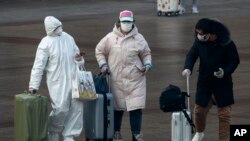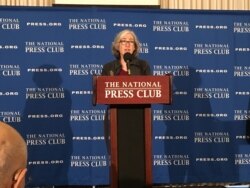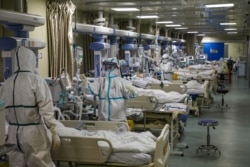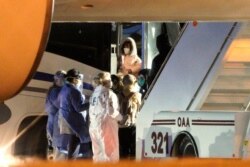U.S. health officials again pressed China to accept U.S. expert help to work on the novel coronavirus outbreak.
The World Health Organization sent an advance team of international experts to China on Monday, but it is not yet known if Americans were part of that group. The WHO did not respond to VOA's question about the make up of the team.
Dr. Anne Schuchat, Principal Deputy Director of the Centers for Disease Control and Prevention, told reporters Tuesday at the National Press Club in Washington that “CDC has provided names for the WHO team and we’re usually part of WHO teams.”
Schuchat emphasized American epidemiologists, virologists, infection control experts, quarantine experts “have a lot to offer,” and that it can be very helpful for China to have outside experts in the midst of an epidemic.
American experts are expected to learn more about the disease as they fight it.
“It is very critical right now for us to understand all the different routes of transmission, the full severity, which can help us with our models of what the impact may be, if this spreads to many countries,” said Schuchat.
Since early January, the U.S. has been offering to send experts to China to help with the coronavirus outbreak.
The U.S. Centers for Disease Control and Prevention on January 6 first offered to send an American team, and on January 27, the Health and Human Services Secretary Alex Azar reiterated the offer to his Chinese counterpart Dr. Ma Xiaowei.
After WHO Director-General Tedros Adhanom Ghebreyesus secured Chinese President Xi Jinping’s agreement to accept an international team of experts during their meeting on January 28, U.S. officials moved to incorporate the American group of experts to the WHO mission to China.
“My understanding is that in the latest discussions there’s been receptivity [on the part of China],” said Schuchat.
Dr. Daniel Chertow, head of Emerging Pathogens Section at the National Institute of Health, also stressed the need to send American experts to China at a coronavirus conference at the Hudson Institute Monday.
“We certainly would like our experts to be present and to be part of what’s happening on the ground to answer some of the really important fundamental questions,” said Chertow. He mentioned the fatality rate and asymptomatic spread as areas that need further research.
Chertow also pointed out the U.S. and China could coordinate developing vaccines and therapeutics “rather than have duplicative efforts.”
American health experts also urged China to tap into America’s expertise in controlling epidemics.
Lawrence Gostin, a public health law professor at Georgetown University and Director of the WHO Collaborating Center on National and Global Health Law, told VOA Mandarin Service that China should invite U.S. CDC experts and give them full access.
Gostin noted, “I would call in a significant contingent of WHO’s Health Emergencies Program, U.S. CDC and other very experienced epidemic fighters. I would have them in force on the ground with full access to all information, independently verifying information so that there were true international partners with China working on this outbreak.”
Meanwhile, the first group of Americans evacuated from Wuhan, the epicenter of the new coronavirus, are expected to be released Tuesday following quarantine.
Schuchat at the NPC briefing said “today is the 14th day of the quarantine of individuals who were on the first charter flight returning from Wuhan province, they’re currently being assessed to make sure they remain symptom-free and then we hope that they’ll be released to travel to their home today.”
Schuchat explained the 195 people who arrived in the U.S. on January 29 have been monitored closely during the two weeks and have not come down with the virus. The group, mostly U.S. State Department employees and their families, were evacuated from Wuhan aboard a U.S. government-chartered cargo jet and flown to March Air Reserve Base in Riverside County east of Los Angeles.
Also on Tuesday, the 13th case of coronavirus in the U.S. was confirmed in California in a person under quarantine after returning from Wuhan.
But Schuchat stressed U.S.’s containment strategy has been successful so far. She explained the 13 individuals in the U.S. had very mild symptoms and that there’s not been widespread transmission as 11 of them traveled to the Hubei province and two others had household contact with one of the cases.
Calla Yu of VOA's Mandarin Service contributed to this story.







